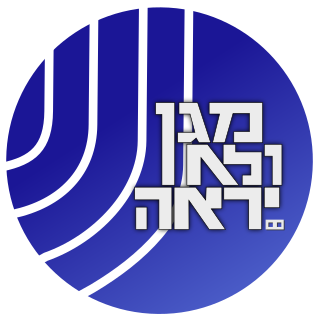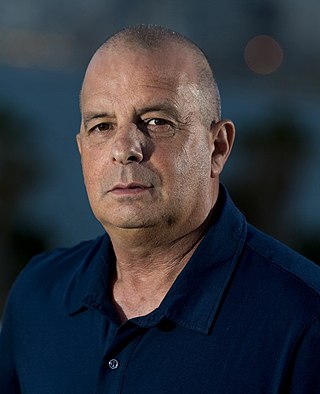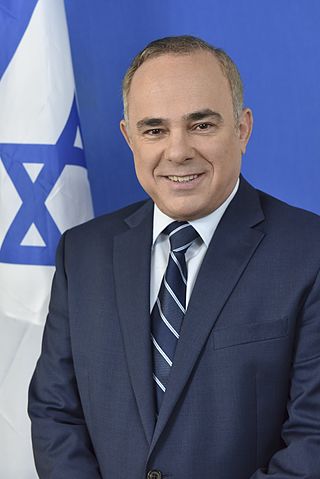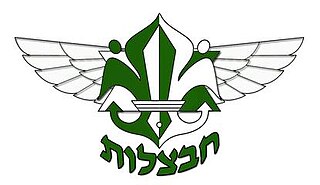Special forces units in the Israel Defense Forces encompass a broad definition of specialist units. Such units are usually a regiment or a battalion in strength.

The Israel Security Agency, better known by the acronyms Shabak or Shin Bet, is Israel's internal security service. Its motto is "Magen v'lo Yera'eh". The Shin Bet's headquarters are located in northwest Tel Aviv, north of Yarkon Park.

Security forces in Israel include a variety of organizations, including military, law enforcement, paramilitary, governmental, and intelligence agencies.

The Israeli Military Intelligence, often abbreviated to Aman, is the central, overarching military intelligence body of the Israel Defense Forces. Aman was created in 1950, when the Intelligence Department was spun off from the IDF's General Staff. The Intelligence Department was composed largely of former members of the Haganah Intelligence Service. Aman is an independent service, and not part of the ground forces, Navy or the Air Force.

Aluf Meir Dagan was an Israel Defense Forces Major General (reserve) and Director of the Mossad.

The Military Advocate General is responsible for implementing the rule of law within the Israel Defense Forces. The unit's objectives include integrating the rule of law amongst IDF commanders and soldiers; providing commanders with the tools for the effective performance of their missions in accordance with the law; and working with the IDF to achieve its goals on all legal fronts. The MAG Corps has the ability to provide legal advice in emergencies and during warfare.

The Israeli Military Censor is a unit in the IDF Directorate of Military Intelligence tasked with carrying out preventive censorship inside the State of Israel regarding the publication of information that might affect the security of Israel. The body is headed by the Israeli Chief Censor, a military official is appointed by Israel's Minister of Defense, who bestows upon the Chief Censor the authority to suppress information he deems compromising from being made public in the media. On average, 2240 press articles in Israel are censored by the Israeli Military Censor each year, approximately 240 of which in full, and around 2000 partially.

Unit 8200 is an Israeli Intelligence Corps unit of the Israel Defense Forces responsible for clandestine operation, collecting signal intelligence (SIGINT) and code decryption, counterintelligence, cyberwarfare, military intelligence, and surveillance. Military publications include references to Unit 8200 as the Central Collection Unit of the Intelligence Corps, and it is sometimes referred to as Israeli SIGINT National Unit (ISNU). It is subordinate to Aman, the military intelligence directorate.

Yuval Diskin is a former director of the Israeli Internal Security Service Shabak, serving as its 13th director from 2005 to 2011. He was appointed by Prime Minister Ariel Sharon, and later served under subsequent Prime Ministers Ehud Olmert and Benjamin Netanyahu.
The Research Department is a unit in the IDF Directorate of Military Intelligence (Aman) that serves as the national assessor of intelligence in the State of Israel.

Yuval Steinitz is an Israeli politician who served as a member of the Knesset for the Likud party. He also held several ministerial posts, including Minister of Finance, Minister of Intelligence, Minister of Strategic Affairs and Minister of Energy. Steinitz holds a PhD in philosophy and has been a senior lecturer at the University of Haifa.

The Foreign Affairs and Defense Committee is a permanent Knesset committee which oversees key Foreign and Defense issues of the State of Israel, including the drafting of legislation, supervision over related government ministries and the approval of their budgets. It is regarded as one of two most important Knesset committees.
Signals intelligence by alliances, nations and industries comprises signals intelligence (SIGINT) gathering activities by national and non-national entities; these entities are commonly responsible for communications security (COMSEC) as well.
The counter-terrorism page primarily deals with special police or military organizations that carry out arrest or direct combat with terrorists.

The Ministry of Intelligence was a government ministry in Israel. It oversaw policies related to the operation of the intelligence organizations, the Mossad and the Shabak, in support of the national security of the State of Israel, in coordination with and under the guidance of the prime minister.

The Institute for Intelligence and Special Operations, popularly known as Mossad, is the national intelligence agency of the State of Israel. It is one of the main entities in the Israeli Intelligence Community, along with Aman and Shin Bet.

The Havatzalot Program is an elite program in the Israel Defense Forces, aimed at training highly skilled intelligence officers for key roles in Israel's Military Intelligence Directorate, also known as Aman. Havatzalot's cadets complete a full three-year bachelor's double major degree at the Hebrew University of Jerusalem. The first major is a unique compilation of different courses in Middle Eastern studies, political science and sociology. The cadets are free to choose their second major from the following options: Mathematics, Philosophy, Computer Science and Economics. In addition to academic studies, the cadets go through rigorous military and intelligence training, including visits to various IDF units, combat recruit training and officers' course. The three years of training are followed by six years of service in key positions in Aman. The Havatzalot Program is Aman's flagship program and is regarded as one of the most prestigious programs in the IDF.
Shimon Levinson was a senior Israeli intelligence officer who was arrested for spying for the Soviet Union in 1991. He is considered to have been one of the highest-ranking KGB moles in Israel.

The Israeli Intelligence Corps, abbreviated to Haman is an Israel Defense Forces corps which falls under the jurisdiction of IDF Directorate of Military Intelligence (Aman) and is responsible for collecting, disseminating, and publishing intelligence information for the General Staff and the political branch.
The history of Israel's intelligence services dates back to 1929, during the British Mandate in Palestine, many years before the declaration of an independent Jewish state. Conflicts with the Arab population, as well as contradictions with the British authorities, required intelligence assessment to prevent militant attacks on Jewish settlements and to ensure the illegal immigration of Jews into Palestine. It was at this time that the first Jewish intelligence service, the Shai, was established.





















